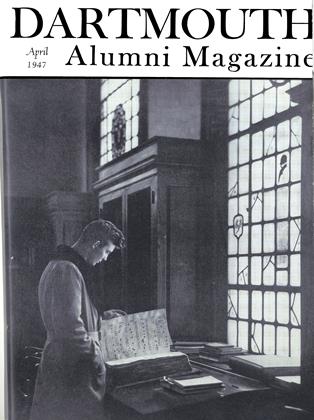Proposed Schedule, Devised by Prof. Robinson, Will Bring Back Classes Which Were in College Together
IN A BULLETIN to all class officers last month the proposal was made for a new plan of class reunions that would bring back to Hanover classes that were in college together rather than classes separated by five-year intervals, as is now the custom. This would become effective in June 1948 if approved by the class officers at their meetings in Hanover on May 16-17 and by the Alumni Council in June. In order to secure the widest possible alumni opinion about the new Dartmouth Reunion Plan, an explanation of the chart on the opposite page is presented below. Prof. Robin Robinson '24 of the Mathematics Department, with the help of Donald W. Cameron '35, general chairman of reunions, has developed the plan; and alumni opinion concerning it will be welcomed by class officers before they vote upon its proposed adoption next month.
LAST YEAR'S EXPERIENCE
Following the program of summer reunions held last year, opinion of all class officers who had directed their weekend programs was invited on the question of repeating the plan of scheduling reunions for classes that were in college together. The response was almost unanimously in favor of a reunion plan offering reunion with adjacent classes. This endorsement was qualified to a certain degree. The plan appeared worthwhile provided one's own class was returning on its normal five-year cycle. Some of these remarks were as follows: "Yes, if we do not miss out on our regular year." .... "Reunions should be no more than four or five years apart." .... "OK, if we can reune with the classes behind and ahead of us." .... "Fine if we do not give up our own regular reunion dates." .... "Wonderful if on our year." .... "Only if we do not give up our regular reunion." .... "With the class behind and ahead."
Dix PLAN STUDIED
A discussion of the Dix Plan was introduced, but investigation has shown great dissatisfaction among most colleges, particularly men's colleges, who have followed the Dix Plan, principally because of the extreme irregularity of reunion dates.
Obviously not all classes can keep their regular dates and also hold reunions with classes that were in college at the same time. There has to be some give in the plan to make it work. Professor Robinson, from all of these points of view, has developed the Dartmouth Plan, which is outlined on the opposite chart. This plan comes closest to any known of alleviating the objections raised by the class officers, while still maintaining as much of the combination factor as possible.
FEATURES OF THE DARTMOUTH PLAN
The following are the principal points of the proposed plan:
1. Of the twelve reunions normally held by a given class, six will continue to be held on the regular five-year dates: the 10th, 25th, 40th, 50th, and later reunions.
2. The remaining six, the sth, 15th, 20th, 30th, 35th, and 4.5 th, will be held in combination with two other classes in college at the same time. These combination reunions will be held on the year due for the middle class of that group, with the other two classes merely advancing or delaying their reunion by one year.
3. For these six combination reunions, each class will be the middle class twice, thus returning on the normal five-year cycle. It will twice delay its reunion by one year, and twice advance it by one year.
4- Thus a class anticipating all reunions under this plan, will actually return to Hanover for eight of its reunions on the regular five-year cycle, and in no case will the class be more than one year away from its normal year. In no case will reunions be less than four, or more than six years apart.
The Robinson Plan is recommended to Dartmouth class officers as an improvement over the Dix Plan. It offers participation in the type of reunion that proved so successful last year, while keeping the reunions of each class close to the normal five-year schedule. At the same time, it fits into the eating and dormitory situation without over-burdening the College, since twelve classes return for reunions each year.
The problem of transition from the normal five-year cycle of reunions to any new combination plan is a difficult one. However, because eight out of every ten classes had reunions last summer, 1948 immediately becomes the best year for Dartmouth alumni to consider any shift from past reunion programs.
AUTHOR OF THE NEW PLAN: Professor Robin Robinson '24 of the Mathematics Department, who devised the reunion chart on the opposite page.
 View Full Issue
View Full Issue
More From This Issue
-
 Article
ArticleFreedom of the Screen
April 1947 By WALTER WANGER '15 -
 Article
ArticleCharles Edward Hovey '52
April 1947 By ALLAN MACDONALD -
 Class Notes
Class Notes1918
April 1947 By ERNEST H. EARLEY, DONALD L. BARR -
 Article
ArticleA Challenge Still Unanswered
April 1947 By BUDD SCHULBERG '36 -
 Article
ArticleThe Undergraduate Chair
April 1947 By Charles Clucas '44 -
 Class Notes
Class Notes1917
April 1947 By MOTT D. BROWN, DONALD BROOKS
Article
-
 Article
ArticleWORKING ONE'S WAY to Europe aboard
February 1956 -
 Article
ArticleAlumni Articles
November 1959 -
 Article
ArticleMen Should Do So Well
FEBRUARY • 1988 -
 Article
ArticleMentors & Friends
APRIL 1998 -
 Article
ArticleSpring Sports
July 1956 By CLIFF JORDAN '45 -
 Article
ArticleTRAINING FOR AMERICAN CITIZENSHIP BY THE PUBLIC SCHOOLS OF PORTO RICO
JUNE 1906 By L. R. Sawyer '00

